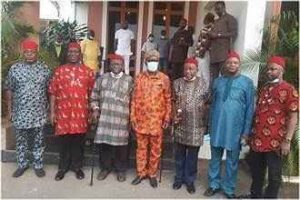The Ohanaeze Ndigbo Youth Council Worldwide has expressed hope regarding the ongoing reforms at the Nigerian National Petroleum Company Limited (NNPCL), emphasizing that these changes will foster socioeconomic development both within the company and across Nigeria.
In a statement released by the council’s National President, Mazi Okwu Nnabuike, he highlighted recent improvements in crude oil production and leadership transformations under Mele Kyari’s guidance, suggesting they could lead to a brighter future for the organization.
Nnabuike noted, “This week, NNPCL announced a significant production milestone of 1.8 million barrels of crude oil per day, with aspirations to reach two million barrels by December 2024, aligning with President Bola Tinubu’s targets.”
He further welcomed the recent appointments within NNPCL, including Mr. Adedapo Segun as Chief Financial Officer, Mr. Isiyaku Abdullahi as Executive Vice President (EVP) for Downstream, and Mr. Udobong Ntia as EVP for Upstream.

“The Ohanaeze Ndigbo Youth Council Worldwide is encouraged by the positive developments within NNPCL, which we believe signal a hopeful trajectory for Nigeria’s oil and gas industry. The achievement of 1.8 million barrels per day is an outstanding milestone, showcasing the dedication of NNPCL’s leadership and the joint efforts of our security forces in safeguarding national resources.”
While commending NNPCL’s progress, the council also addressed the pressing economic issues affecting Nigerians. Nnabuike acknowledged the hardships many face due to high petrol prices, urging Chief Kyari and NNPCL to promptly reassess the current petrol pricing structure. “A reduction in petrol prices would greatly alleviate the burdens on Nigerians during these tough times,” he stated.
“The Ohanaeze Ndigbo Youth Council Worldwide is committed to supporting initiatives that will boost our economy and enhance the welfare of our people. We eagerly anticipate further advancements and are optimistic that NNPCL’s current direction will pave the way for a revitalized Nigerian economy.”




